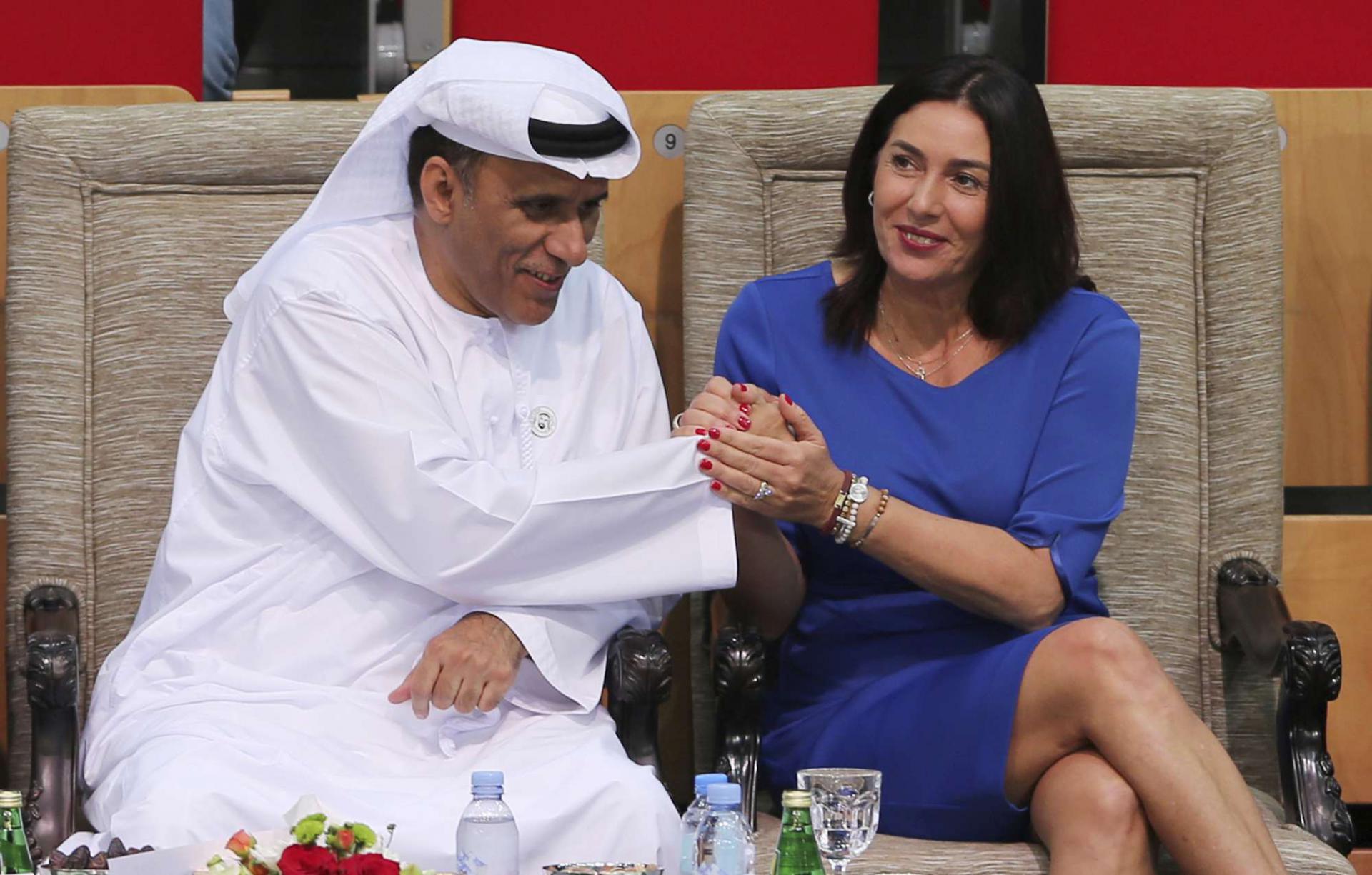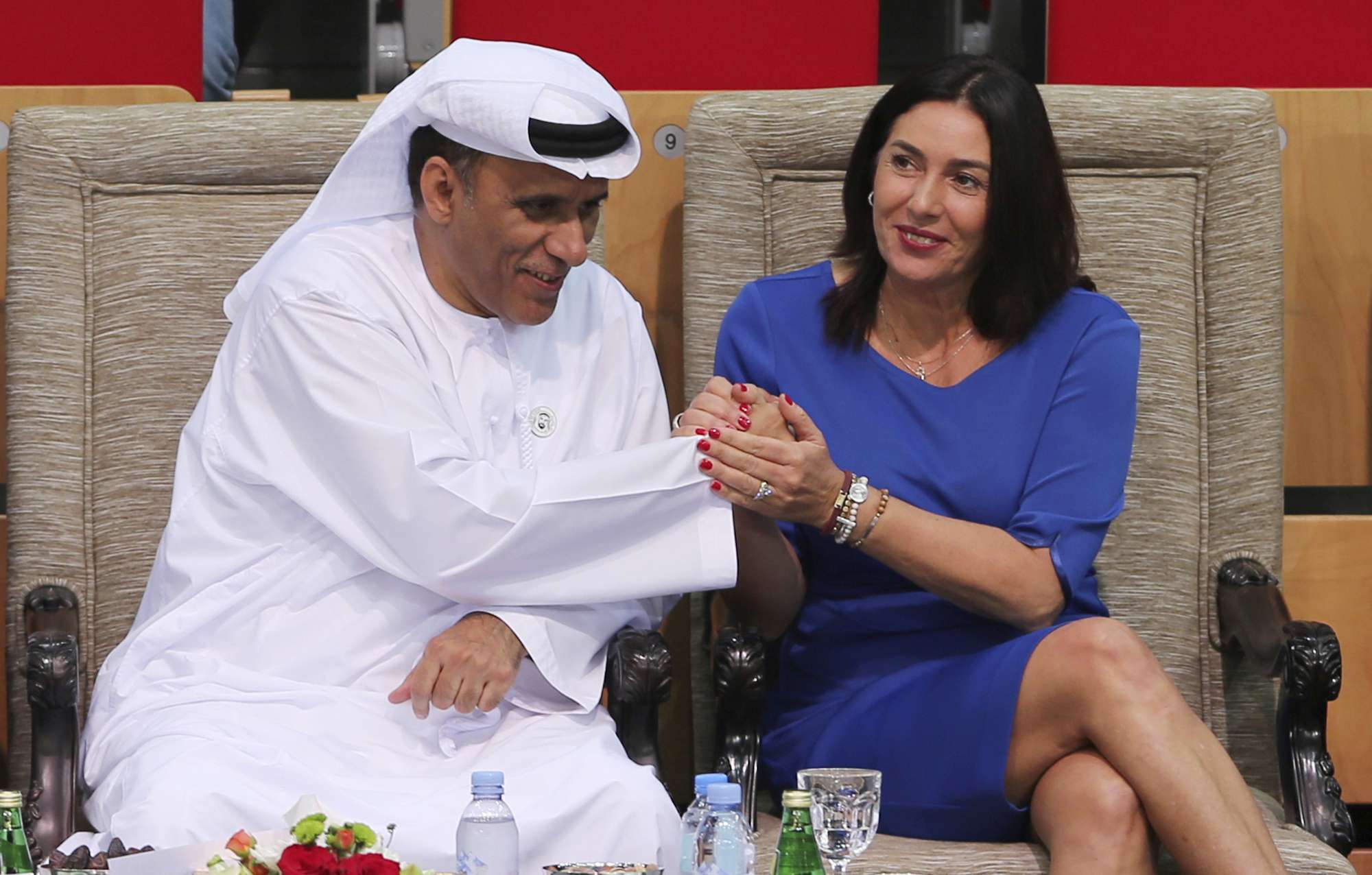Gulf rulers embrace Israel over shared fear of Iran
DUBAI - As Israel and Iran clash in Syria, Israeli Prime Minister Benjamin Netanyahu's government is courting Gulf Arab states at a time when broader policies align against their common rival Tehran.
Netanyahu on Thursday held surprise talks with Oman's Sultan Qaboos in Muscat -- accompanied by the head of Mossad, according to Netanyahu's office -- raising Palestinian fears of a normalisation of ties.
And in the UAE, a scene unthinkable just weeks ago: an Israeli Cabinet minister, tears of joy filling her eyes, proudly singing her country's national anthem at a sports event in the heart of the Arab world.
The spectacle of Miri Regev singing "HaTikva," which describes the Jewish yearning for a homeland in Zion, was just one in a series of taboo-busting public appearances by Israeli officials in Gulf Arab states that have thrust the once-secret back channels of outreach into public view.
Regev's visit especially raised eyebrows over anti-Arab and anti-Muslim sentiments she has expressed in the past, such as describing the Muslim call to prayer as the “crying dogs of Mohammed”, appearing in a video with Israeli football supporters chanting genocidal anti-Arab slogans, and saying that Palestinians have no 'national rights'.
At home, she is an outspoken nationalist popular with hardliners and Jewish settlers. But while in Abu Dhabi, Regev was invited to tour the grand Sheikh Zayed Mosque: wearing a loosely wrapped headscarf and the traditional floor-length gown known as an abaya, she was warmly welcomed by local officials.
"These were important talks, both for the state of Israel and very important talks for Israel's security," Netanyahu told his Cabinet on Sunday. "There will be more."
As he spoke, Regev was with an Israeli delegation at a judo tournament — the scene of her happy tears after Israeli judoka Sagi Muki won the gold medal — and Netanyahu's communications minister was also headed to the UAE for a security conference.
Meanwhile Israel's transportation minister, Yisrael Katz, is scheduled to head to Oman next week for a transportation conference where he plans on presenting his plan for a rail link between Gulf Arab countries and Israel.
The driving force in these visits seems to be a shared concern over Iran. The apparent bolstering of relations comes as the United States pushes tighter sanctions on Saudi Arabia's regional rival and, like Israel, holds firm to its demand that Tehran have no say in the reconstruction of Syria.
In parallel, US President Donald Trump has made no secret of his ties to -- and views on -- Saudi Arabia, which had cooled during the Obama administration.
Trump refused to take a firm stand on the murder of Saudi journalist Jamal Khashoggi, which has thrown into disarray Saudi Arabia's carefully crafted reformist image and could push the kingdom to seek support across the region. Saudi Arabia has not officially reacted to the Israeli visits.
And while Israel's attempt to woo this region has been a long time in the making, analysts say, the tussle between Iran on the one hand and the United States, Israel and Gulf on the other has propelled the talks to new, and public, heights.
'Window of opportunity'
Gulf states have held clandestine talks with Israel for decades, going back to at least the early 1980s. Arab leaders have not, however, historically publicised talks over fears of a public backlash over the Palestinian-Israeli conflict.
Broader policy alignment, primarily on the need to contain Iran, may have emboldened both sides to now make those talks public as Israel vows to prevent Tehran from entrenching itself militarily in Syria, where Iran backs President Bashar al-Assad in the civil war.
"Policy alignment is bringing them closer, if not yet together," said Elizabeth Dickinson, senior analyst at the International Crisis Group.
"Pressuring Iran and squeezing its regional activity is a first order priority in Israel and also in certain Gulf capitals. Riyadh, Abu Dhabi, and separately Tel Aviv, all feel it is imperative to seize the current window of opportunity -- in which the US administration is also prioritising Iran."
The Gulf initiatives also comes ahead of possible Israeli elections early next year, and improved relations with Arab states could boost Netanyahu's standing at home.
"Israel was always inclined to make such meetings public. It was the Arabs who were very sensitive to photo-ops of the sort because of public opinion" and the Palestinian issue, said Yoel Guzansky, senior fellow at the Institute for National Security Studies and former head of the Gulf department for Israel's National Security Council.
The public rapprochement could also aim "to acquaint the Gulf street, public opinion, to ties with Israel, so that when something happens it won't be a total surprise, and the public will understand the rationale -- that Israel is not the enemy.
"Someone else is the enemy. And this someone else is Iran."
It also provides an opportunity for these Arab countries to curry favor in Washington. President Donald Trump has promised to present a plan for the "Deal of the Century" for Mideast peace, and Saudi Arabia's dependability as an influential conduit has been thrown into question amid the fallout from the killing of Khashoggi in the kingdom's Istanbul consulate.
Palestinians, meanwhile, fear that Trump is using the Iran issue to rally support from Gulf states in order to pressure the Palestinians into accepting a peace plan that falls far short of their demands.
'New pragmatism'
Iran, predictably, condemned the recent spate of visits by Israeli officials.
“This regime seeks to create divisions between Muslim countries and obscure 70 years of usurpation, rape and killing of the oppressed Palestinians,” Iranian Foreign Ministry spokesman Bassam Ghasemi said.
“History and experience show that retreating and acquiescing to the illegitimate demands of the United States and the usurper Zionist regime will make them bolder and more dominant in the region, while ignoring the Palestinian people’s legitimate rights,” he said.
While the visits by Netanyahu and his Likud Party ministers are a huge public relations boost for him domestically, they do not immediately signal a widespread Arab embrace of Israel.
The Palestinian-Israeli conflict remains an emotional issue with the Arab public, and relations will likely remain limited without a peace agreement.
Israeli forces have killed over 160 Palestinians during months of protests in the Gaza Strip against an Israeli blockade and a deepening humanitarian crisis. The peace process has been frozen for years, and Palestinian President Mahmoud Abbas cut ties with Washington after the White House recognized Jerusalem as Israel's capital last year and moved its embassy to the city.
Israel has full diplomatic relations with only two Arab states, Egypt and Jordan.
Qatar has informal ties to both Israel and rival Iran, with which it shares a gas field. Until 2000, the emirate was home to an Israeli trade representative office. Doha also provides humanitarian assistance -- and fuel -- to the Gaza Strip, under an agreement with Israel backed by United States.
At a regional defence conference in the Bahraini capital on Friday, Omani Foreign Minister Youssef bin Alawi bin Abdullah said it might be "time for Israel to be treated the same (as states in the Middle East) and also bear the same obligations" -- a statement endorsed by Bahrain.
The Omani statement, according to the forum's official blog, aims to "move the Israel-Palestine narrative on from past intractability to a new focus on pragmatism".
But Oman's position has sparked fears of what Palestinian presidential advisor Mohammad Shtayyeh called "the start of a public normalisation and the end of the Arab peace initiative", a 2002 proposal for Arab states to restore ties with Israel in return for the creation of a Palestinian state.
"Arab dictatorships in Saudi Arabia, the UAE, Qatar and Bahrain are cosying up to Israel's apartheid regime to curry favour with the Trump administration as a means to protect their shaky thrones," said Omar Barghouti, co-founder of the Boycott, Divestment and Sanctions movement (BDS).
"Palestinians are counting on the peoples of the Arab region, including the Gulf, and not on the unelected, ruthless despots, to stand with us in our struggle for freedom, justice and equality."



